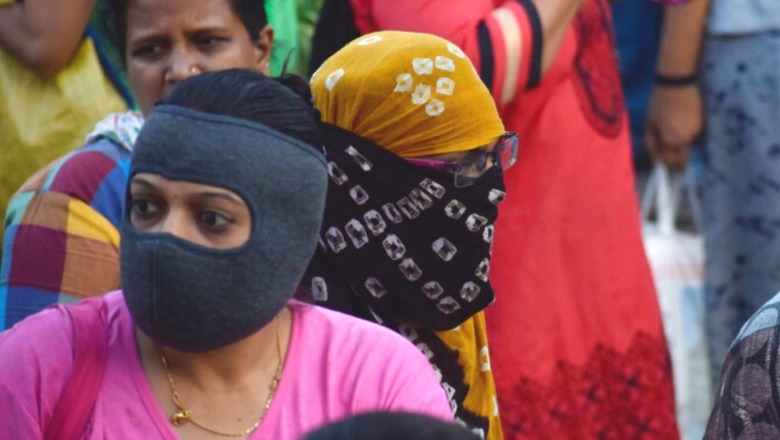
views
Kerala has started registering a slight uptick in Covid-19 cases. Ernakulam, Thiruvananthapuram, and Kottayam are the three districts that have been seeing a rise.
However, state health minister Veena George on Friday said there was no need for concern. Following a high-level review meeting on Covid, George said that although there is a slight increase in the number of infections in the state currently, the cases are only of the Omicron variant of the virus.
As per the union ministry of health and family welfare, active cases in the state were at 8,542 on Tuesday.
With the caseload again increasing in the state, public health experts say there are multiple reasons behind the fresh surge. Key ones are a strong testing mechanism, literate population, densely populated and culturally social state, delayed infection due to slow spread of the virus followed by an obvious complacency, etc.
The number of reported infections depends on a strong surveillance, tracking, tracing, and testing mechanism, experts pointed out.
“Kerala is more transparent in reporting cases now post the Supreme Court’s intervention last August,” Dr Libin Abraham, research associate, department of microbiology and immunology, University of British Columbia, Vancouver, believes. “Also, Kerala conducts more tests per population. The higher test positivity ratio (TPR) and more transparent reporting can push the state high in the list when compared to other states.”
The premise holds weight because, in the last two years, Kerala has been known for conducting more tests – more than double the number of tests per million against the national average.
The total testing per million population in the state, till June 2021, stood at 2.2 times the national average.
Apart from the fair reporting of cases, population density is also a key factor. Kerala is known as one of the states with high population density and “for a respiratory virus that spreads by aerosols, this is an excellent opportunity for transmission”, Abraham said. “Of course, there are many other densely populated parts outside Kerala but are they also reporting as good as Kerala? Maybe not? Dense population along with a great testing strategy holds the key.”
Dr Nandkumar Naik, member of pro-left science and cultural organisation Kerala Sasthra Sahitya Parishad, believes that it is the “social setup” of the densely populated state that plays an interesting role.
“Here people are more involved in the social circles and celebrate festivities, get together in congregations,” Naik said, while adding that if an asymptomatic or mildly ill person decides to go to the market without wearing a mask, he/she has a high likelihood of meeting another person on the way. “They are more social. That’s how the chances of forming a chain of transmission are high in a Kerala-like society where people are happy to meet each other more often.”
He also believes that the decent vaccination coverage – which stands at around 87% for double doses – gives overconfidence of protection which induces complacency. “This complacency gets turned into re-infection.”
High literacy resulting in more health-seeking behaviour
According to Dr Arun NM, an internal medicine expert who is a member of the state Covid taskforce, “Kerala, in the last two years, has been recognised as a top-performing state in terms of compliance to mask-wearing even when compared to Europe or the US. In fact, 40 to 50% of the population still wears masks. It means that due to higher compliance of Covid-19 protocols, there could be an estimated 20 to 30% of the state’s population which might have not contracted Covid and now they are catching the infection with a bit of a fall in compliance and opening of the economy.”
Also, high literacy leads to more testing. “Due to a high literacy rate, there is more health_seeking behaviour in the state with the availability of sufficient testing mechanisms. This becomes one of the primary reasons behind the strong testing mechanism of Kerala,” said Dr Arun.
He added that with the opening of the global economy, more and more people are travelling due to work and personal reasons which also adds to testing (as people get tested prior to travelling).
Dr Naik, quoted earlier, also echoed similar views.
“The health-seeking behaviour is high in the state which means more testing. When more tests are conducted, the chances of finding more positives is also high,” he said, adding, “We must focus on hospitalisations and deaths. Both are negligible in Kerala as hospital beds and ICUs are near vacant here.”
ICMR’s new testing strategy fits well on Kerala
Also, ICMR’s new testing strategy to focus tests in community settings on people with symptoms and/or people at risk – those above 60 years and individuals with chronic lifestyle diseases, and people with recent international travel history – fits uniquely well on Kerala’s demography.
According to Shinsmon Jose, scientist and research instructor at the division of infectious diseases, college of medicine, University of Cincinnati, USA, “Data suggests that Kerala is among the states with one of the highest numbers of diagnosed Covid-19 cases in India. 11 out of the 14 districts in Kerala have a TPR above 5%, with three districts (Kottayam, Ernakulam, and Kozhikode) above 10%.”
Multiple factors could come into this, Jose said, adding that the demography of the state is especially relevant considering the updated ICMR testing guideline.
“Kerala, with an ageing population with significant expat movement, may tick all boxes that directly targeted testing,” said Jose. “This is a good thing, considering the increased likelihood of diagnosing, treating, and isolating infected individuals.”
Read all the Latest India News here
















Comments
0 comment